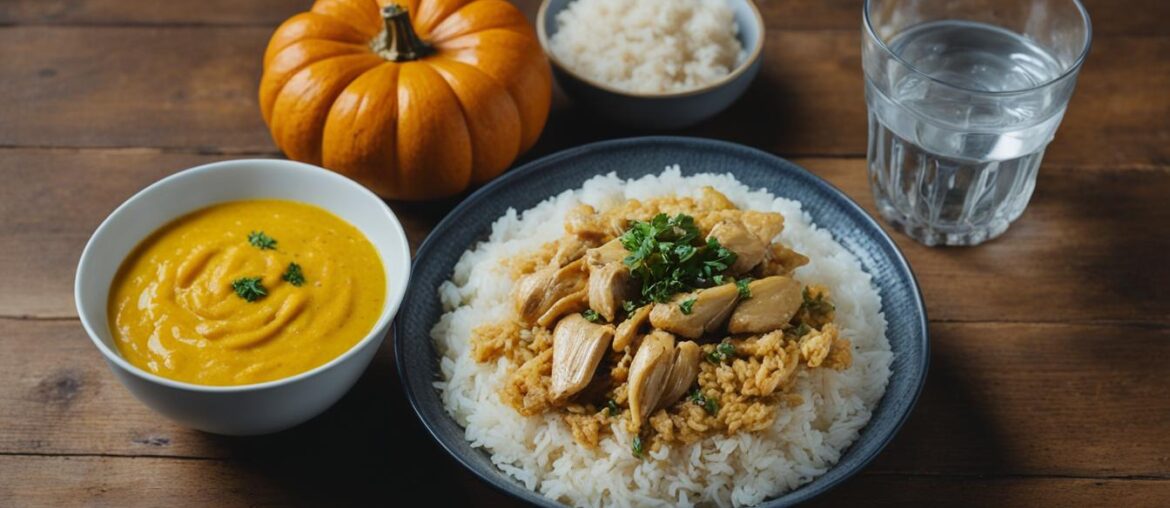When your beloved furry friend is sick and has no appetite, it can be heartbreaking. However, it’s important to take the right steps to ensure they receive proper nutrition and support their recovery. In this article, I will discuss the best foods to feed a sick dog with no appetite and provide valuable tips for maintaining their well-being during this time.
Key Takeaways:
- Consult with a veterinarian if your dog refuses to eat for 24 to 48 hours.
- Offer bland and easily digestible foods like boiled chicken and pumpkin to stimulate their appetite.
- Consider age-specific feeding tips for puppies and older dogs.
- Proper nutrition is crucial for your sick dog’s recovery and overall well-being.
- Transition your dog back to their regular diet gradually once they show improvement.
Why Won’t My Sick Dog Eat?
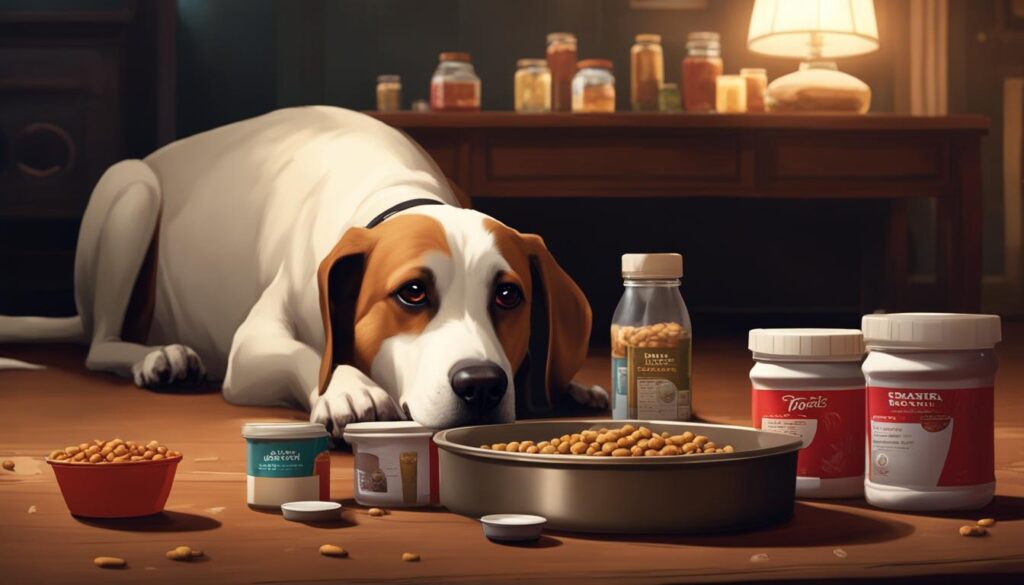
If your dog is sick and has lost their appetite, it is crucial not to disregard this symptom. Loss of appetite can be an indication of a more serious underlying health issue. It is essential to seek advice from a veterinarian, especially if your dog is young, old, or displaying other symptoms. Prompt veterinary care can help identify any potential health concerns and ensure your dog receives the appropriate treatment.
Loss of appetite in sick dogs is a common problem that can have various causes. It can be a result of the illness itself, pain or discomfort, nausea, or a side effect of medication. However, it is important to consult with a veterinarian to understand the specific reason why your sick dog is not eating.
Veterinarians play a crucial role in diagnosing the root cause of a sick dog’s loss of appetite. They will conduct a thorough examination, consider the dog’s medical history, and may recommend additional tests or imaging to identify any underlying health conditions.
Seeking veterinarian advice for sick dogs not eating is essential as it can help provide valuable insights and guidance tailored to your dog’s specific needs. Veterinarians have the knowledge and expertise to diagnose and treat a wide range of illnesses and can recommend appropriate treatment options to help stimulate your dog’s appetite and promote their overall well-being.
Remember, loss of appetite in sick dogs should never be ignored, and seeking veterinary assistance is always recommended. Early intervention and proper medical care can make a significant difference in your dog’s recovery and ensure they receive the necessary support to overcome their illness.
Best Foods for Sick Dogs with No Appetite

Once your dog has received a clean bill of health from the veterinarian, you can begin to consider suitable food options for a sick dog with no appetite. Offering bland and easily digestible foods is often the best approach.
Some recommended options include:
- Limited ingredient dog food: These specially formulated foods contain a minimal number of ingredients, making them gentle on your dog’s stomach.
- Boiled chicken: Cooked chicken is a popular choice for dogs with no appetite. It is highly palatable and easy to digest.
- Pumpkin: Canned pumpkin is another option that can aid digestion and provide essential nutrients. Make sure to use plain, unsweetened pumpkin puree.
- High-fiber foods: Adding high-fiber foods like cooked brown rice or oatmeal can help with vomiting or diarrhea by regulating the digestive system.
It is crucial to avoid triggering any food allergies or sensitivities your dog may have. Always introduce new foods gradually and monitor your dog’s response. If you notice any adverse reactions, discontinue the food immediately and consult with your veterinarian.
| Food | Description |
|---|---|
| Limited ingredient dog food | A specially formulated dog food with a minimal number of ingredients, ideal for dogs with sensitive stomachs. |
| Boiled chicken | Cooked chicken is highly palatable and easy to digest, making it an excellent choice for sick dogs. |
| Pumpkin | Canned pumpkin provides essential nutrients and aids digestion. Opt for plain, unsweetened pumpkin puree. |
| High-fiber foods | Add cooked brown rice or oatmeal to regulate your dog’s digestive system and help with vomiting or diarrhea. |
Feeding Tips for Specific Conditions
Feeding sick dogs requires careful consideration, and different age groups may require specific approaches to ensure their well-being. Puppies, for instance, have weaker immune systems and can quickly deteriorate if not properly nourished. If you have a sick puppy, it is crucial to consult with a veterinarian for appropriate feeding tips to support their recovery.
Older dogs, on the other hand, may experience a loss of appetite due to various reasons, such as arthritis pain or underlying health issues. To help stimulate their appetite and ensure they receive the necessary nutrients, it is recommended to work closely with a veterinarian. They can provide valuable guidance in addressing your older dog’s specific concerns and recommend appealing and nutritious foods.
When it comes to feeding sick puppies, their young age and vulnerable state require extra care and attention. Follow the feeding tips below to support their recovery:
- Consult with your veterinarian to determine the appropriate diet for your sick puppy.
- Offer small, frequent meals throughout the day to prevent discomfort and aid digestion.
- Choose easily digestible foods, such as boiled chicken or bland puppy food options.
- Ensure the food is at room temperature to increase palatability.
- Use enticing food toppers or mix in a small amount of low-sodium chicken broth to enhance the flavor.
Feeding sick older dogs can be a unique challenge, as their age-related issues may affect their appetite. To guide you in providing the best care for your senior canine companion, here are some feeding tips specifically tailored for sick older dogs:
- Consult a veterinarian to identify any underlying health issues contributing to the loss of appetite.
- Find soft and easily chewable foods that are gentle on their teeth and gums.
- Ensure the food is nutritionally balanced and meets their specific dietary needs.
- Consider adding canned or wet food to their diet to increase moisture content and palatability.
- Provide small, frequent meals to avoid overwhelming their digestive system.
- Monitor their weight and adjust their portion sizes accordingly to prevent excessive weight loss or gain.
Remember, every dog is unique, and it’s crucial to consult with a veterinarian to determine the most suitable feeding tips for your sick puppy or older dog. Their professional advice will ensure your furry friend receives the care and nutrition they need during their recovery process.
When to Seek Veterinary Assistance
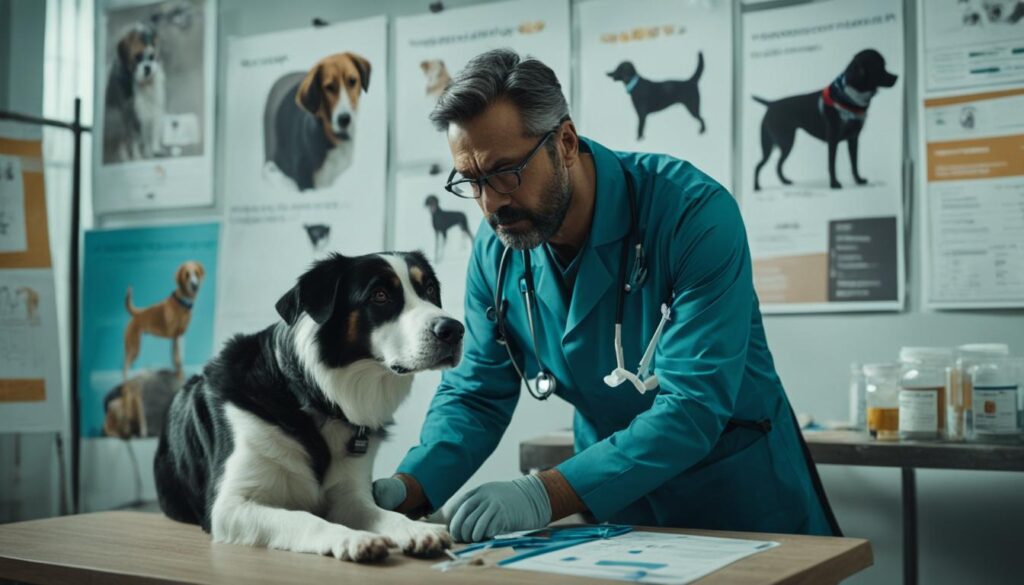
If your dog continues to refuse food for 24 to 48 hours, it is time to seek veterinary assistance. This extended period without eating can be a cause for concern, indicating an underlying health problem. The veterinarian will perform a physical examination and may recommend further tests, such as blood work or scans, to determine the cause of your dog’s lack of appetite. In some cases, hospitalization may be necessary to rehydrate the dog and provide necessary medical interventions.
When a dog refuses to eat for an extended period, it can be a sign of a more serious health issue. That’s why it is crucial to seek veterinary assistance if your dog is not eating. A veterinarian will be able to assess your dog’s overall condition, conduct necessary tests, and provide appropriate medical interventions. This intervention is essential to ensure your dog’s health and well-being.
During the veterinary consultation, the veterinarian will perform a physical examination to assess your dog’s overall health. They may also recommend additional diagnostic tests, such as blood work or imaging scans, to identify any underlying medical conditions that may be causing the lack of appetite. Hospitalization may be necessary in severe cases to provide intravenous fluids and medications to rehydrate the dog and address any underlying health concerns.
It’s important not to delay seeking veterinary assistance when your dog is not eating. Prompt intervention can help identify and address any potential health issues, improve the chances of successful treatment, and support your dog’s overall well-being.
Additional Tips to Stimulate Your Sick Dog’s Appetite
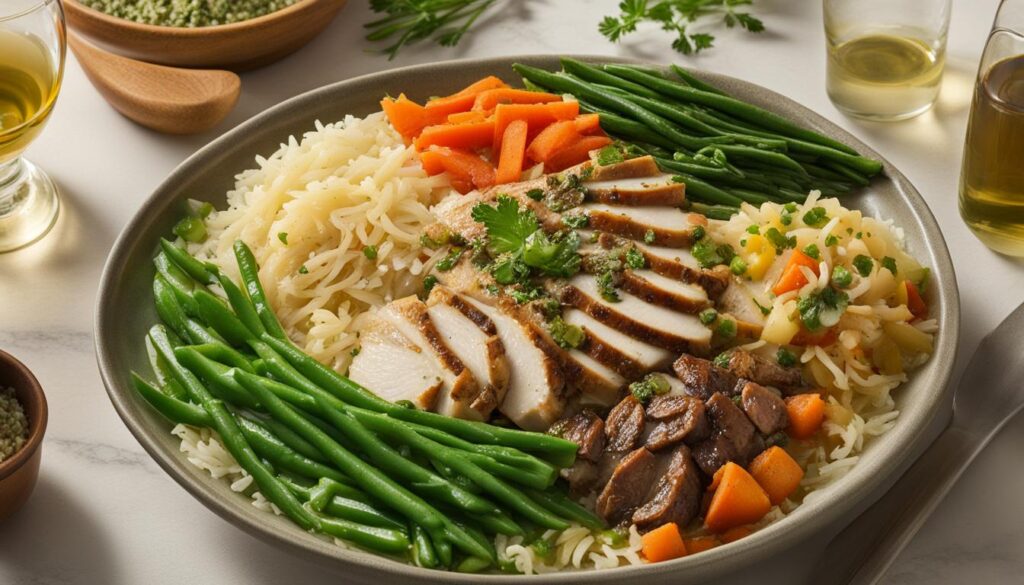
In some cases, dogs may require additional assistance to regain their appetite. When your furry friend is sick and not eating, it can be worrisome. However, there are several effective ways to stimulate your sick dog’s appetite and help them get the nutrition they need for a speedy recovery.
Create a Calm and Comfortable Eating Environment
Providing a calm and comfortable environment for your sick dog during mealtime can make a significant difference in stimulating their appetite. Choose a quiet area free from distractions and noise. Use a clean and easily accessible food bowl, ensuring it is at a comfortable height for your dog to reach without straining.
Offer Smaller, More Frequent Meals
When a dog is not feeling well, offering smaller, more frequent meals throughout the day can encourage them to eat. This approach avoids overwhelming their digestive system and makes it easier for them to consume the food. Divide their daily food portion into several smaller meals and offer them at regular intervals.
Introduce Food Toppers and Flavors
If your sick dog is not enticed by plain food, adding food toppers or experimenting with different flavors can make mealtime more appealing. Food toppers such as bone broth or low-sodium chicken stock can enhance the aroma and taste of their regular food, making it more enticing for them to eat. Additionally, consider adding cooked vegetables or a small amount of grated cheese to create variation and increase the appeal of their meals.
Medication for Appetite Stimulation
For dogs with a severe loss of appetite, your veterinarian may prescribe medication to stimulate their hunger. These medications can help increase their interest in food and encourage them to eat. It is essential to follow your veterinarian’s recommendations and carefully administer any prescribed medication.
Utilize Veterinary-Approved Appetite Stimulants
In some cases, veterinary-approved appetite stimulants can be effective in encouraging a sick dog to eat. These medications are specifically designed to stimulate appetite and can provide much-needed support for dogs struggling to regain their appetite. Consult with your veterinarian to determine if appetite stimulants are suitable for your dog’s condition.
| Additional Tips to Stimulate Your Sick Dog’s Appetite |
|---|
| 1. Create a calm and comfortable eating environment |
| 2. Offer smaller, more frequent meals |
| 3. Introduce food toppers and flavors |
| 4. Utilize veterinary-approved appetite stimulants |
By implementing these additional tips, you can help stimulate your sick dog’s appetite and provide them with the necessary nutrients to aid in their recovery. However, it is crucial to consult with your veterinarian before making any changes to your dog’s diet or introducing new medications. They will provide expert guidance tailored to your dog’s specific needs and help you navigate the best approach for supporting their appetite and overall well-being.
The Importance of Proper Nutrition for Sick Dogs
Providing your sick dog with proper nutrition is vital for their recovery. Adequate nutrition supports the immune system, aids in healing, and provides the energy necessary for the body to fight off illness. Even if your dog has no appetite, finding ways to offer nutrient-dense foods or working with a veterinarian to provide necessary dietary supplements is crucial. This ensures their body receives the necessary nutrients to maintain optimal health during this difficult time.
Transitioning Back to Regular Diet
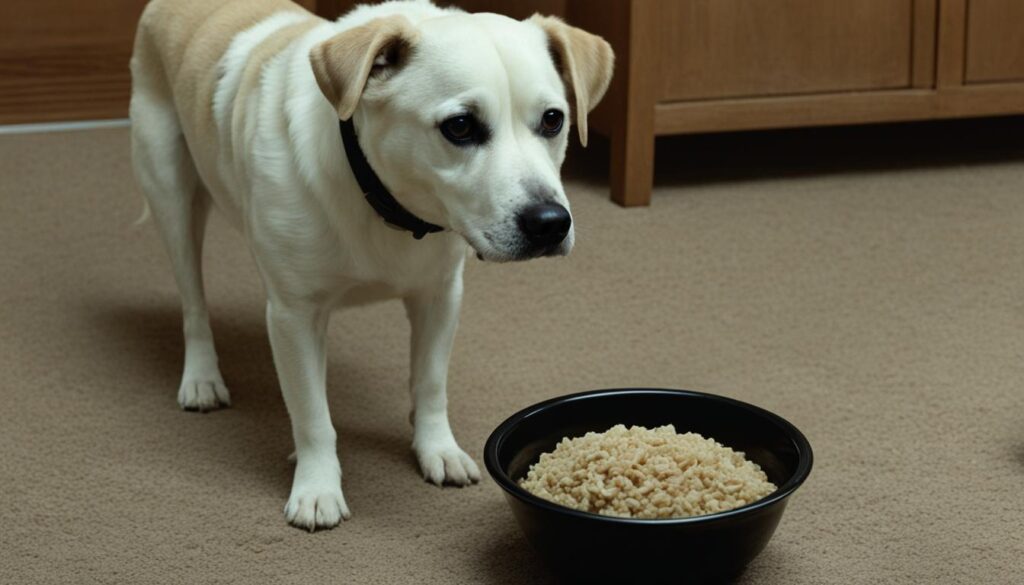
Once your dog starts showing signs of improvement and their appetite returns, it’s important to transition them back to their regular diet gradually. This process helps avoid any digestive disturbances and allows their system to adjust back to their usual diet smoothly. Here’s how you can reintroduce your dog to their regular food:
-
Start by incorporating small amounts of their regular dog food into the meals you were providing during their illness. This can be done by mixing a small portion of the regular food with the supplemental food.
-
Gradually increase the proportion of their regular dog food while decreasing the portion of the supplemental food. The transition should be done over a span of several days to allow their digestive system time to adjust.
-
Monitor your dog’s response to the transition. If they tolerate the regular food well and continue to show signs of improvement, you can gradually eliminate the supplemental food.
Remember, every dog is unique, and the transition time may vary. It’s essential to observe your dog closely during this period and consult with your veterinarian if you encounter any concerns or difficulties.
Key tips when transitioning back to a regular diet:
- Take it slow: Gradually integrate regular food to prevent digestive issues.
- Observe your dog: Monitor their response to the transition and make adjustments as needed.
- Consult your veterinarian: Seek professional advice if you have any concerns or questions.
Ensuring Safe Foods for Sick Dogs
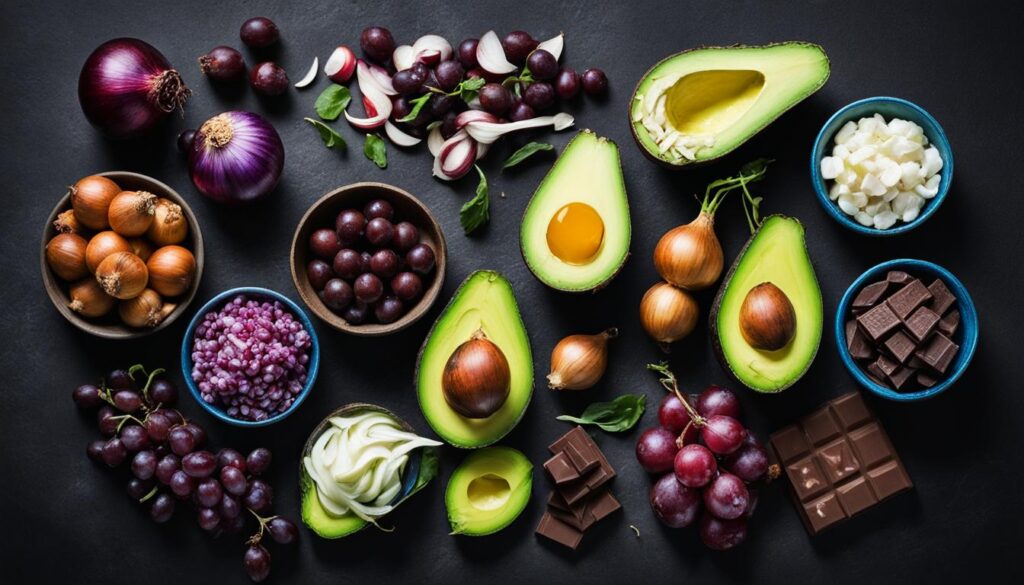
Providing appropriate foods for a sick dog is crucial for their recovery and well-being. However, it is equally important to be aware of the foods that should be avoided, as they can worsen your dog’s condition or cause discomfort. Here are some foods to avoid feeding a sick dog:
- Oils and butter: These high-fat foods can be difficult for a sick dog to digest and may lead to gastrointestinal upset.
- Seasoning: Spices, herbs, and seasonings can irritate a sensitive stomach and should be avoided.
- Raw foods: Raw meat, eggs, or bones can increase the risk of bacterial contamination and digestive problems.
- Dairy products: Dogs with no appetite may struggle to digest lactose found in dairy products, leading to diarrhea or upset stomach.
- High-fat foods: Fried or greasy foods can be heavy on an already compromised digestive system and may worsen symptoms.
- High-sodium foods: Excessive sodium intake can lead to dehydration and can be harmful to a dog’s overall health, especially when they are sick.
Remember, each dog is unique, and their specific condition may require additional dietary restrictions. Always consult with your veterinarian to ensure the foods you are offering are safe and suitable for your dog’s specific needs.
Keeping Your Dog’s Well-being in Mind
“Proper nutrition plays a crucial role in supporting a sick dog’s recovery and overall well-being.”
Ensuring that your sick dog receives a nutritionally balanced diet is essential for their healing process. By avoiding foods that could worsen their condition and following your veterinarian’s guidance, you can provide them with the best chance for a speedy recovery.
Wrapping Up
Feeding a sick dog with no appetite requires careful consideration and guidance from a veterinarian. It is important to seek professional advice to understand the underlying cause and determine the best course of action for your furry friend’s recovery.
When providing food to a sick dog, opt for bland and easily digestible options such as limited ingredient dog food, boiled chicken, pumpkin, and high-fiber foods to ease any gastrointestinal issues. Avoid triggering any food allergies or sensitivities your dog may have. Offering smaller, more frequent meals can help entice them to eat.
Monitoring your dog’s progress closely is essential throughout the feeding process. Each dog’s situation is unique, and ensuring they receive proper nutrition and care is crucial for their well-being. Work closely with a veterinarian to adjust the feeding plan as necessary and support their overall recovery.
Remember, providing the right foods, seeking veterinary advice, and closely monitoring your sick dog’s feeding journey is key to helping them regain their appetite and get back on their paws.
FAQ
What should I feed a sick dog with no appetite?
It is recommended to offer bland and easily digestible foods such as limited ingredient dog food, boiled chicken, pumpkin, and high-fiber foods. Consult your veterinarian to avoid triggering any food allergies or sensitivities.
Why won’t my sick dog eat?
Loss of appetite in sick dogs can be a sign of underlying health issues. Seeking advice from a veterinarian is crucial to identify any potential concerns and ensure appropriate treatment.
What are the best foods for sick dogs with no appetite?
Bland diet options such as limited ingredient dog food, boiled chicken, pumpkin, and high-fiber foods can be beneficial for sick dogs with no appetite.
Are there specific feeding tips for sick puppies?
Yes, puppies have weaker immune systems and may need special feeding approaches when sick. Consult a veterinarian for appropriate tips and advice.
Are there specific feeding tips for sick older dogs?
Yes, older dogs may have different reasons for loss of appetite. Working with a veterinarian to address underlying health issues and finding appealing and nutritious foods can help stimulate their appetite.
When should I seek veterinary assistance if my dog has no appetite?
If your dog refuses food for 24 to 48 hours, it is time to seek veterinary assistance. Extended lack of appetite can be a cause for concern and may indicate an underlying health problem.
Are there additional tips to stimulate my sick dog’s appetite?
Yes, your veterinarian may prescribe medication or other interventions to stimulate your dog’s appetite. Offering smaller, more frequent meals and creating a calm eating environment can also help. Experimenting with different flavors or textures may entice your dog to eat.
How important is proper nutrition for sick dogs?
Proper nutrition is vital for a sick dog’s recovery. It supports the immune system, aids in healing, and provides the energy needed to fight off illness.
How do I transition my sick dog back to a regular diet?
Gradually incorporate small amounts of their regular dog food into the meals provided during their illness. Slowly decrease the portion of the supplemental food until your dog is eating their regular diet again.
Are there foods I should avoid feeding my sick dog?
Yes, you should avoid feeding your sick dog oils, butter, seasoning, raw foods, dairy products, high-fat foods, and high-sodium foods. Always consult with your veterinarian to ensure the foods you offer are safe and suitable for your dog’s condition.


